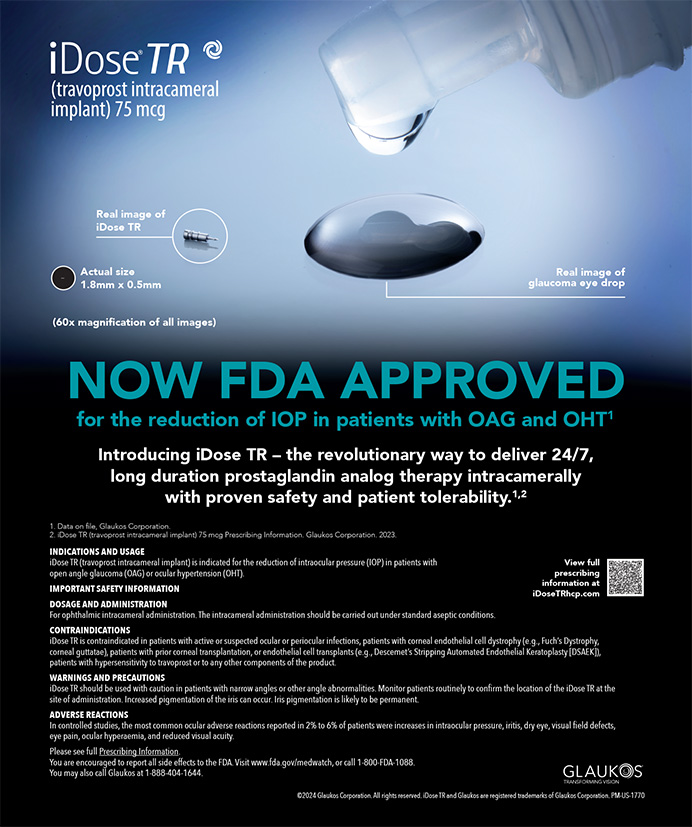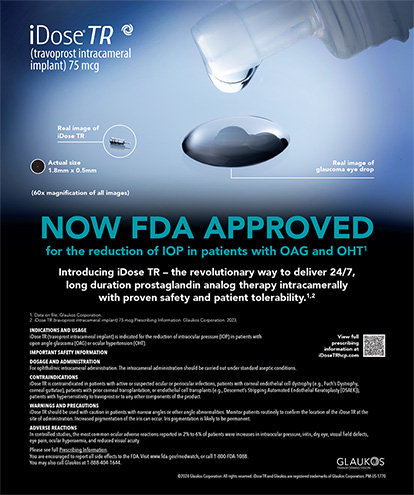How did your training under Richard Troutman, MD, influence you?
Dr. Troutman was a technically superb corneal and anterior segment surgeon— probably the best I have ever seen. He thrived on new ideas, and his pursuit of excellence was an inspiration. Dr. Troutman provided a model on which I have based my professional life, and he taught me many lessons. To this day, the most relevant one is that, no matter how busy my professional life is, I should take a day off every week to think, write, and plan. Although it has been tough for me to juggle commitments, I have stuck to this rule, and it has made for a very enjoyable life in ophthalmology.
What are the top lessons you drew from your term as president of the International Society of Refractive Surgery in 2001?
My presidency of the International Society of Refractive Surgery (ISRS) occurred after 15 years' involvement with the society as a member, director, and president elect. The ISRS (now ISRS/AAO) was, and still is in my view, the world's premier forum for education in refractive surgery.
The 1980s and 1990s were a crazy time in refractive surgery, and the ISRS was at the center of it. The best refractive scientists and clinicians were members of the organization. Everything was changing so quickly; an idea that seemed absurd at first glance was incorporated into practice a year later. The ISRS helped refractive surgery transition to a precise and safe subspecialty within mainstream ophthalmology. The top lessons I learned during my presidency were to keep an open mind, that good ideas can come from anywhere on this planet, and above all, not to ignore the data.
Based on your experience with laser cataract surgery, what pearls can you offer colleagues who are transitioning to this procedure?
I have performed laser cataract surgery for over a year now. After 450 cases, my advice is to think of laser cataract surgery as a completely new operation, not just an adjustment of a current technique. Find an experienced colleague to visit and watch him or her perform surgery. Learn every aspect of this new procedure. Initially, reduce the number of cases on your operating lists so that you can approach the new surgical procedure in a calm and methodical way without being rushed. Once you feel comfortable, then begin building up your numbers. Above all, enjoy this great innovation in cataract surgery.
What does it mean to you personally and professionally to be a consultant ophthalmologist to the Australian Defense Force and the New South Wales Rugby Union?
I was privileged to serve as surgeon lieutenant in the Royal Australian Navy early in my career and to have had a longtime association with the Army, Navy, and Air Force. It has been a privilege to be involved in decision making with the Australian Defense Force and to interact with professionals outside of medicine who take their jobs very seriously. The New South Wales Rugby Union has simply been fun. It is nice to have a connection with elite athletes and to see how they approach what for them is work but for the rest of us is entertainment.
What prompted your interest in karate, and how have you benefited from your training in martial arts?
I have been involved in karate since my late teens. I lapsed for years and then took it up again in middle age. Karate is central to my life, as it provides me with strength, fitness, and flexibility. All martial artists who continue on the path will understand when I say that there is an element beyond the physical that comes with time, practice, and dedication. Some years ago, I switched from karate to aikido, a Japanese martial art that teaches you to blend with your opponent rather than to attack him or her. In aikido, you convince an adversary that resistance is futile. This is very helpful in a group ophthalmology practice also!
At the center of martial arts, whether it is karate or aikido, in the blur and tension of fighting or blending with an opponent, there is a moment when you can achieve stillness. Time slows, and you attain a calm, centered concentration on what is occurring. This skill has been very helpful to me when performing eye surgery, particularly difficult cases, because it allows me to remain physically and mentally calm and to focus entirely on the task in front of me.


